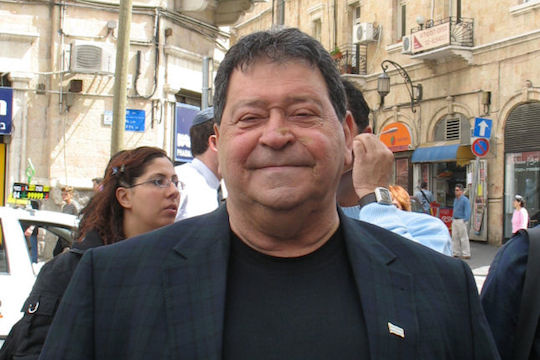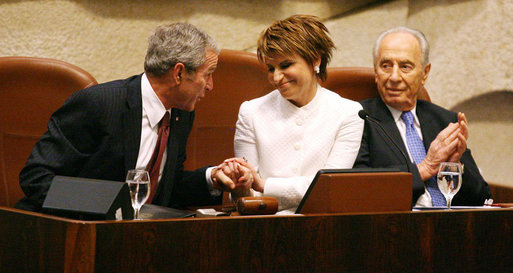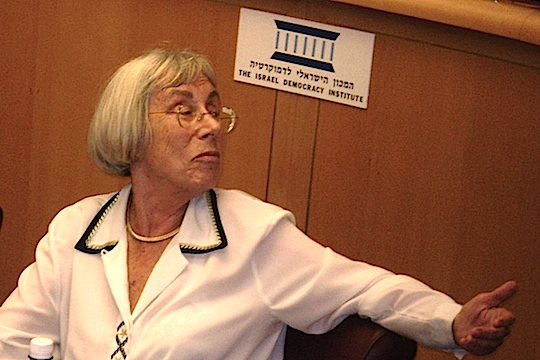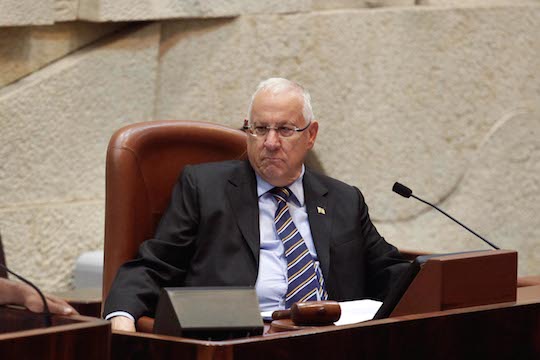The opposition is scrambling as Benjamin Ben-Eliezer withdraws days before elections. The Left’s best candidate may well be on the Right, but political tribalism looks set to triumph.
Labor’s candidate for president, Benajmin “Fuad” Ben-Eliezer announced on Saturday that he is withdrawing from the race, just four days before the vote. Ben-Eliezer’s decision came after he spent much of Friday being interrogated concerning allegedly illicit cash transfers from an Israeli businessman, which allowed Ben Eliezer to purchase a luxurious penthouse apartment in Jaffa late last year.
Questions have been asked about the house before, as the Labor candidate’s 60 years on state salaries – first in the IDF and then as parliamentarian and minister – made such an ostentatious purchase somewhat suspicious. The prosecution and police, however, moved in only after businessman Abraham Nanikwashwili was implicated in another investigation, that of bribery and nepotism at the port of Ashdod. According to several reports in the Israeli media, police reviewed Ben Eliezer’s bank accounts without his knowledge and found transfers that the veteran parliamentarian failed to report to the Knesset.
The candidate was called in for questioning on Friday morning, and when interrogators deemed his replies unsatisfactory and evasive, he was told that he was now being interrogated under caution. On Saturday afternoon, Ben Eliezer announced that he was withdrawing his name from the race, decrying the timing of the questioning as suspicious and the entire investigation as a “targeted assassination attempt” against his political career.
A scramble for candidates
The withdrawal leaves the center-left without its most senior candidate, and sent parliamentarians scrambling for a figure behind whom they can unite – if not for the first round of votes then for the crucial second one, which will be held to determine which of the two leading candidates will receive over 60 votes (in other words, over half the votes available in the Knesset to become Israel’s 10th president). The challenge is made all the greater considering the vote, by law, is private and confidential; at the end of the day, each MK will be voting according to his or her conscience, and party discipline cannot really be enforced.
To add to the opposition’s woes, for each characteristic they might require of a centrist president, there is more than one candidate to choose from. Centrist? All four: former Knesset speaker Dalia Itzik, former finance minister Meir Sheetrit, Nobel Laureate Dan Shechtman and former Supreme Court Justice Dalia Dorner. Above the fray of recent Knesset politics? Three out of four (Itzik retired from the Knesset in 2009). Utterly apolitical? Dorner and Shechtman. Women? Itzik and Dorner. And so on.
Each candidate also has their faults and weaknesses, which some MKs might find more difficult to swallow than others. Sheetrit, hailing from the smallest and most centrist party in the coalition that has not yet found the guts to head to opposition, has by now been written off by most analysts, which tends to be a self-fulfilling prophecy.
Dalia Itzik is too reminiscent of Ben-Eliezer in her relationship with major Israeli business interests; while no criminal investigation has been started (yet), questions are already being asked about her purchase of a multi-million shekel apartment in central Tel Aviv. Memories of her trying to mollify journalists writing about her corporate allies have already begun to surface. And last month, The Marker‘s investigative reporter, Sharon Shpurer, revealed that since her retirement, Itzik has been enjoying a lush career as a corporate board member, receiving hundreds of thousands of shekels for a few hours of her time each month. When confronted about it by Shpurer, Itzik replied: “Who do you want me to work for, poor people?” Not exactly sterling presidential stuff, especially for an Israel exponentially more concerned about crony capitalism and social justice than about the Israeli-Palestinian conflict.
This shift of focus makes many see Justice Dorner as a compelling candidate for the center-left; many recall her role in the landmark Danilowitz ruling, which heralded a new era of equality for same-sex couples, and her firm stance against white-collar criminals. Many more forget her earlier role as president of the Military Courts in the Occupied Palestinian Territories in the 1970s, the era before human rights NGOs and the interventionism of the High Court of Justice in how the occupation was run.
What’s more, few of the journalists championing her candidacy for president remember how lackluster was her tenure in her most recent public role, that of president of the Press Association, where she has served since 2006 and where she failed to take a determined stance in any of the crises of freedom of press in Israel during her term (the Kamm-Blau affair and Prisoner X affairs, to name but two). The ultra-Orthodox parties in the Knesset, which could well once again be kingmakers, have a long-standing beef with the Supreme Court and might well regard these elections as payback time. Additionally, a few of their MKs will be trepidatious about voting for a woman for the top job, even if others among them might see it as a timely and fairly risk-free opportunity to give a nod to gender equality.
The next presidential term might be the most challenging yet
Dorner’s record of standing firm to financial powers notwithstanding, it is this more recent record of failing to stand up to state power that should be giving pause to potential supporters. In a way, Shechtman shares the same fault: both he and Dorner are too aloof, too clean, too apolitical. This might be attractive in the short term, considering this has been the dirtiest presidential run in recent memory. But this dirt was just a harbinger of things to come.
Over the next few years, the separation of powers and the structure of government are set to become the key battlefields of Israeli politics; Netanyanu, Liberman, Livni and others want to centralize power in Israel, sucking authority away from the legislature and the judiciary in favor of a bolstered executive, perhaps even a presidential republic. This new arena requires a president who not only cherishes the parliamentary and democratic institutions enough not to be tempted by any short-term boosts to his own power, but knows how to affect parliamentary politics (while remaining above the fray, as the office demands).
Even if Shechtman and Dorner can attest to the their faith in these democratic principles (despite not having a record of such attestations recently), they manifestly lack the set of skills to protect them and to navigate the presidency through the impending crises – both constitutional and diplomatic ones, as the two-state solution finally begins to implode.
The best president for the Left, for whom the Left will never vote
To many, the ideal candidate to tackle both would be another former Knesset speaker and current frontrunner for the job, the Likud’s Reuven (“Ruvi”) Rivlin. As speaker, Rivlin’s commitment to parliamentary democracy (and democracy in general) saw him turn time and again against his own party and its allies, stalling most of the anti-democratic legislation pushed by Benjamin Netanyahu’s Likud and Liberman’s Israel Beitenu, while at the same time trying to instruct his fellow right-wing legislators about the dangers of nationalist populism.
As a staunch right-winger, Rivlin is opposed to partition but is emphatically opposed to racism, coupling his opposition to a Palestinian state with support for offering Israeli citizenship to all Palestinians. While this is a stance being taken up by a number of right-wing politicians in recent years, Rivlin, as a democrat, goes one step further. When I interviewed him for Foreign Policy four years ago, for instance, he spoke nostalgically of a rotation-based executive espoused by Revisionist Zionists like Ze’ev Jabotinsky – and held up by Belfast as one possible inspiration for a future of power-sharing. It’s a far cry from nationalist self-determination, or from the one state advocated by Palestinians and the pro-Palestinian Left. But it still offers infinitely more room for maneuver than anything ever plausibly offered or actually given to Palestinians by the centrist two-state Left.
Rivlin is certainly no left-winger – he hasn’t opposed any Israeli military operation and as communication minister in Sharon’s first cabinet, he presided over a major privatization drive. Still, Rivlin’s tenure as Knesset speaker earned him praise in liberal circles (including the soubriquet of “a bulwark” for democracy from The Economist), and the lasting ire of both Netanyahu and Liberman. Netanyahu, in a lamentable display of panic amplified by a petty squabble with Rivlin over some comments the latter made about Netanyahu’s wife, tried preventing Rivlin’s candidacy by canceling the presidential post at a few week’s notice, and trying to recruit American author Eli Weisel (who is not even an Israeli citizen) to stand in Rivlin’s place. Only when Weisel refused did the prime minister yield and offered Rivlin his sour-faced support. Even if Netanyahu is getting behind Rivlin only so he can eventually stab him in the back (to borrow a Yes, Prime Minister line), he apparently failed to warn Liberman of this decision, prompting the latter to denounce and renounce Rivlin and to hint he himself might support Dalia Itzik.
Considering Liberman’s own record, his support for Itzik should not come as a surprise. But his explanation of why he won’t vote for Rivlin reads like the best pitch for an opposition vote Rivlin could have wished for:
I have nothing personal against Ruvi. I do have a problem with his positions. I supported him when he ran against Peres [in 2007]… but when he became speaker we realized he wasn’t what we thought. As far as I’m concerned, Rivlin cannot be our candidate for presidency. When he became speaker, his first official visit was to [Palestinian Arab city] Umm el Fahm. If he went to [Druze village] Beit Jan, I wouldn’t have had an issue. But there’s a message about going to Umm el-Fahm. It tells you something.
When we tried to deny [exiled Palestinian MK] Azmi Bishara his parliamentary pension, Rivlin was against. When Faina Kirschenbaum wanted to pass a law against extreme leftist NGOs he was the one to stop this, while at the same time boosting the status of Ahmed Tibi by setting up a parliamentary investigation committee that has not provided a conclusion in six years. He went against us, full on, and this is why we can’t support him.”
And yet, despite such a glowing reference from one of the Left’s arch-enemies, and despite the grief Rivlin’s election would give Netanyahu, there is nothing less likely than the Left rallying to Rivlin’s side (with the exceptions, so far, of Labor’s Shelly Yachimovich and Micki Rozenthal, and Meretz’s Ilan Gilon). This has to do both with sheer political tribalism – Rivlin is from the other gang, the Likud gang, and the Labor-Meretz gang (with a couple of honorable exceptions) seem to have no greater priority than to spite the other bunch, whatever the long-term price may be; and with the fetishization of the two-state solution. Meretz’s Zehava Galon has put it best some weeks ago: “We’ll have freedom of the vote,” she wrote, “but I can’t imagine anyone supporting someone like Rivlin, who believes in a binational state.”
Corpse-worship and tribalism over strategy
No Israeli president can do anything to advance revive the two-state solution. The earth never saw a more adamant two-stater than the departing president Shimon Peres. Yet in his seven years as president, much as in the preceding seven years as the rubber-stamp for Sharon’s and Olmert’s occupation policies, his impact on advancing partition has been nil. Still, Galon has a point: the president is supposed to be the focal point of legitimacy and respectability, and a one-stater in this post can give the one-state approach a crucial push into the heart of the Israeli mainstream.
Nevertheless, it is startling that this consideration alone could drive a committed democrat and anti-Occupation activist like Galon and others like her to support anyone-but-Rivlin. It was particularly jarring when this “anyone,” at the second and crucial round, was most likely to be Ben-Eliezer – oozing cronyism and wading in stale blood from his short, but brutal tenure as Sharon’s defense minister. Ben Eliezer’s complaint about being the victim of targeted assassination rings particularly grotesque, seeing as he alone signed off dozens of orders for literal, not metaphorical, extrajudicial killings of Palestinian militants in less than two years in office. Including the particularly notorious killing of Hamas militant Salah Shehade and 13 civilians that happened to live nearby.
With Ben Eliezer out the leftist vote is splitting. The closest thing to rival of choice to Rivlin is now set be Dorner, who has the liberal rhetoric but not the track record or skill set of standing up to the executive, and no vision to offer for the future of the Israeli-Palestinian strife.





